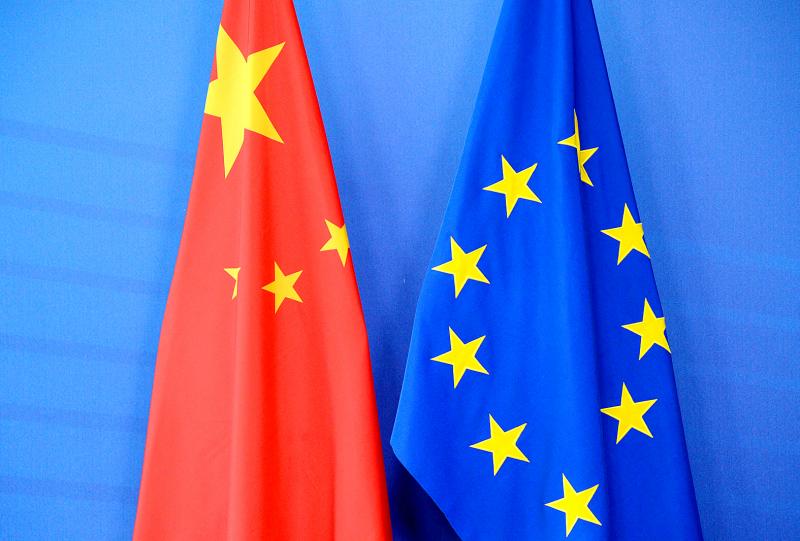China yesterday bristled after Western nations lined up to impose sanctions over its crackdown on Uighur Muslims in Xinjiang, the first concerted international action against Beijing since US President Joe Biden took office.
Rights groups believe at least 1 million Uighurs and other mostly Muslim minorities have been incarcerated in camps in the northwestern region, where China is also accused of forcibly sterilizing women and imposing forced labor.
Beijing has strongly denied the allegations and says training programs, work schemes and better education have helped stamp out extremism in the region.

Photo: Reuters
On Monday, the EU, the UK and Canada blacklisted four former and current officials in the Xinjiang region, while the US, which had already sanctioned two of those officials in July last year, added the other pair to the list.
New Zealand and Australia yesterday welcomed the measures, but both stopped short of introducing their own on China, a major export market for their goods.
Beijing snapped back immediately, announcing entry bans on 10 Europeans — including five members of the European Parliament — as well as two EU bodies and two think tanks.
The head of the EU delegation, as well as the British ambassador to China, have been summoned by the Chinese Ministry of Foreign Affairs as Beijing goes into attack mode, accusing the West of “lies” and “fabrications” over Xinjiang, and downplaying the impact of the coordinated action.
“Frankly ... we are not worried at all,” Chinese foreign ministry spokeswoman Hua Chunying (華春瑩) told reporters.
“We urge others not to underestimate the firm will of the Chinese people to defend their national interests and national dignity,” she said, adding those who do “will eventually pay for their stupidity and arrogance.”
Still, the unified move to sanction the officials signaled a possible watershed in the diplomatic approach toward China.
The British Foreign, Commonwealth and Development Office said the sanctions were “the clearest possible signal that the international community is united in its condemnation of China’s human rights violations in Xinjiang.”
US Secretary of State Antony Blinken said China “continues to commit genocide and crimes against humanity in Xinjiang,” and called on Beijing to “bring an end to the repression of Uighurs.”
The sanctions, whose impact is mainly symbolic, mark the first time Brussels and London have targeted China over accusations of widespread abuses and forced labor in Xinjiang.
China’s tit-for-tat sanctions drew condemnation from the EU.
Reinhard Butikofer, a German legislator targeted by the sanctions, said the response was “brazen and ridiculous”.
The EU faces a delicate balancing act over relations with China, as it treats Beijing as a rival, but also a potential economic partner.
Late last year, Brussels sealed a major investment accord with China after seven years of negotiations.
The pact has to be approved by the European Parliament, but there has been growing opposition to signing off on the deal.

SECURITY: As China is ‘reshaping’ Hong Kong’s population, Taiwan must raise the eligibility threshold for applications from Hong Kongers, Chiu Chui-cheng said When Hong Kong and Macau citizens apply for residency in Taiwan, it would be under a new category that includes a “national security observation period,” Mainland Affairs Council (MAC) Minister Chiu Chui-cheng (邱垂正) said yesterday. President William Lai (賴清德) on March 13 announced 17 strategies to counter China’s aggression toward Taiwan, including incorporating national security considerations into the review process for residency applications from Hong Kong and Macau citizens. The situation in Hong Kong is constantly changing, Chiu said to media yesterday on the sidelines of the Taipei Technology Run hosted by the Taipei Neihu Technology Park Development Association. With

CARROT AND STICK: While unrelenting in its military threats, China attracted nearly 40,000 Taiwanese to over 400 business events last year Nearly 40,000 Taiwanese last year joined industry events in China, such as conferences and trade fairs, supported by the Chinese government, a study showed yesterday, as Beijing ramps up a charm offensive toward Taipei alongside military pressure. China has long taken a carrot-and-stick approach to Taiwan, threatening it with the prospect of military action while reaching out to those it believes are amenable to Beijing’s point of view. Taiwanese security officials are wary of what they see as Beijing’s influence campaigns to sway public opinion after Taipei and Beijing gradually resumed travel links halted by the COVID-19 pandemic, but the scale of

A US Marine Corps regiment equipped with Naval Strike Missiles (NSM) is set to participate in the upcoming Balikatan 25 exercise in the Luzon Strait, marking the system’s first-ever deployment in the Philippines. US and Philippine officials have separately confirmed that the Navy Marine Expeditionary Ship Interdiction System (NMESIS) — the mobile launch platform for the Naval Strike Missile — would take part in the joint exercise. The missiles are being deployed to “a strategic first island chain chokepoint” in the waters between Taiwan proper and the Philippines, US-based Naval News reported. “The Luzon Strait and Bashi Channel represent a critical access

Pope Francis is be laid to rest on Saturday after lying in state for three days in St Peter’s Basilica, where the faithful are expected to flock to pay their respects to history’s first Latin American pontiff. The cardinals met yesterday in the Vatican’s synod hall to chart the next steps before a conclave begins to choose Francis’ successor, as condolences poured in from around the world. According to current norms, the conclave must begin between May 5 and 10. The cardinals set the funeral for Saturday at 10am in St Peter’s Square, to be celebrated by the dean of the College